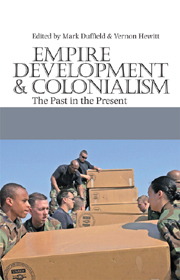Book contents
- Frontmatter
- Contents
- Acknowledgements
- Notes on Contributors
- Introduction
- 1 The Exceptional inclusion of ‘Savages’ & ‘Barbarians’
- 2 Empire, International Development & the Concept of Good Government
- 3 Empire: a Question of Hearts?
- 4 ‘Conflict-Sensitive’ Aid & Making liberal Peace
- 5 Development, Poverty & Famines
- 6 Plain Tales from the Reconstruction Site
- 7 The International Politics of Social Transformation
- 8 Liberal Interventionism & the Fragile State
- 9 Freedom, Fear & NGOs
- 10 Theorising Continuities between Empire & Development
- 11 Spatial Practices & Imaginaries
- 12 Decolonising the Borders in Sudan
- 13 ‘Individualism is, Indeed, Running Riot’
- Index
5 - Development, Poverty & Famines
The Case of British Empire
Published online by Cambridge University Press: 05 February 2013
- Frontmatter
- Contents
- Acknowledgements
- Notes on Contributors
- Introduction
- 1 The Exceptional inclusion of ‘Savages’ & ‘Barbarians’
- 2 Empire, International Development & the Concept of Good Government
- 3 Empire: a Question of Hearts?
- 4 ‘Conflict-Sensitive’ Aid & Making liberal Peace
- 5 Development, Poverty & Famines
- 6 Plain Tales from the Reconstruction Site
- 7 The International Politics of Social Transformation
- 8 Liberal Interventionism & the Fragile State
- 9 Freedom, Fear & NGOs
- 10 Theorising Continuities between Empire & Development
- 11 Spatial Practices & Imaginaries
- 12 Decolonising the Borders in Sudan
- 13 ‘Individualism is, Indeed, Running Riot’
- Index
Summary
Introduction
It is now well known (despite little mention in recent major works, including the current Oxford History of the British Empire) that anything between 30 and 40 million persons died in the wake of famine in India in the half-century following Britain's final military conquest of the Indian subcontinent in 1857. The earlier stages of the conquest and colonisation under the east India Company had also been marked by large-scale famines, in particular the shocking Bengal famine of 1769–70 in which something like 10 million people, or a third of the population, perished. The famines of 1784 (upper India), 1803–6 (Bombay), the 1830s (North India), 1854 (Madras), 1861 (North West), 1865 (Orissa), and 1876–8 (South and North-East) are only now finding an established place in the historiography of India. Although precolonial India had certainly known famine, their frequency, scale and magnitude expanded dramatically and seemingly in line with the disruption to indigenous social and economic structures that accompanied colonial interference and extractions, especially the heavy and unpredictable cost of land revenues.
Cornelius Walford the Victorian demographer calculated that British India experienced 34 separate famines, compared with only 17 recorded instances in the prior two millennia of Indian history. An early critic of British rule complained in 1776, anticipating a major plank of later Indian nationalism, that ‘famine, pestilence and the English have covered our land with horror and desolation’ (Arnold 1999: 99).
- Type
- Chapter
- Information
- Empire, Development and ColonialismThe Past in the Present, pp. 74 - 87Publisher: Boydell & BrewerPrint publication year: 2009



